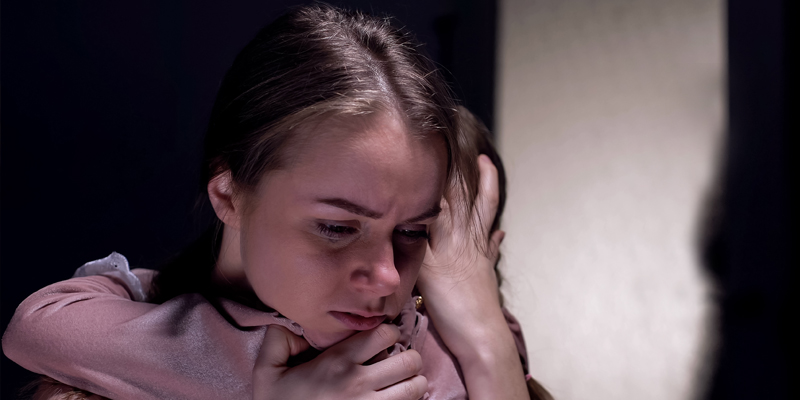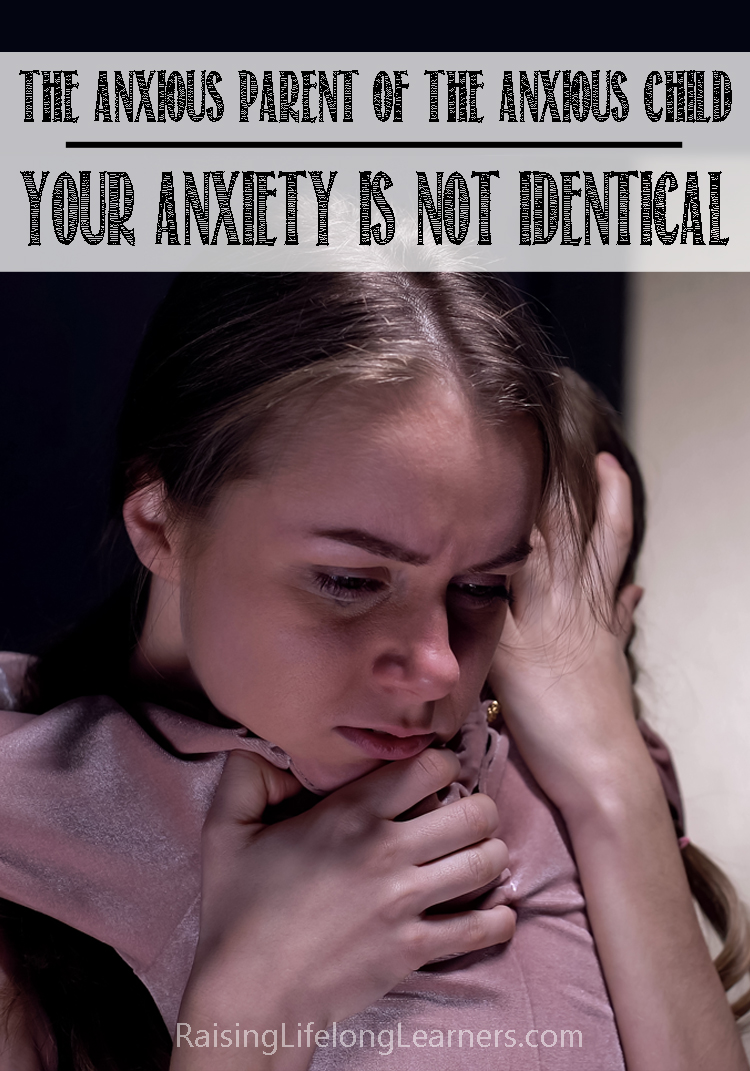The Anxious Parent of the Anxious Child | Your Anxiety is Not Identical
I have three kids. Two are boys, and one is a girl. Two have blue eyes and one has green. Two are currently in public school, and one is homeschooled. One is a sensory seeker, one is a sensory avoider, and one is just sensory stimuli personified. My oldest looks just like my dad, and my other two are pretty much identical, despite being 3 years apart and different genders. As an only child, seeing the differences and similarities in my kids has been fascinating. It’s so interesting which genes chose to take the spotlight and which are hiding behind their counterpart. The fact that the same gene pool can produce three different people with varying levels of similarity is just so wild to me.
My kids also have a lot in common with myself. We’re all fairly tall, we’re all sarcastic, we all have dimples, and we all struggle with anxiety. I’ve battled anxiety for as long as I can remember, having panic attacks in school that were misdiagnosed as asthma. Looking back, I can see how clear my struggle was, how obvious it was that I was plagued by anxiety and obsessive thoughts, yet know one around me recognized the symptoms or even imagined a child could be coping with anxiety. One by one, as my kids were diagnosed with their own anxious issues, in order to assuage my guilt and advocate for them I vowed that I would be the best anxious mom ever. Who else to better understand their struggles, right? I could use my experience and the gaping holes in support I’d experienced to support and encourage my kiddos through their own journeys… right?
Have you ever been so excited to show a favorite movie of yours to your kids? To carry on something beloved from your childhood and laugh together at the shared moments? Am I the only one who pictured idyllic images of snuggling on the couch and watching my child’s eyes fill with wonder as they, too, were deeply affected by moving stories that so touched you as a young person? Yeah, it didn’t really work out that way for me, either.
Cheesy graphics, outdated references, primitive special effects, or just personal taste all seem to work against me when I try to share a movie or favorite show with my kids. They look at me, half unsure and half disgusted but totally unimpressed. What was so special to me just isn’t to them, and what is so exciting for them is often fairly boring or confusing for me. Yes, that’s a very cool Minecraft world, but wasn’t ET awesome? There’s a disconnect between what works for me and what works for them, and the same is true for anxiety.
Once I got over the initial guilt of my children struggling with anxiety, I immediately perked up and realized that I was the perfect parent for them to have. My own experiences and feelings were going to be invaluable to their own coping. Who better to understand their struggles than someone who is down in the trenches with them, right? I put on my empathy pants and got to work relating to them, sharing my own tools, and basically being the most helpful mom alive.
But it didn’t work.
In fact, it made some things worse.
What was going wrong? Why couldn’t I help them? Between my own training as a counselor and my experiences with childhood anxiety, I knew everything I needed to know to help them work through their anxiety. Right?
Not quite.
Related: The Anxious Parent of the Anxious Child | The Guilt of Passing it On , Helping Your Child Cope With Anxiety
It turns out that experience does not always equate to expertise.
We were all students once, but this doesn’t mean we all instinctively know how to instruct. We had parents, caretakers, people who raised us, but that doesn’t mean we know how to parent without doubt. We know what we would appreciate in a teacher, what we would want in a parent, but that is only unique to us, to our experience. Anxiety, much like a fingerprint, is experienced differently among the anxious, each one with their own unique experience.
Where your anxiety may manifest in a racing heart or hypervigilance, your child’s may manifest through stomach aches or irritability. You may struggle with insomnia while your child battles OCD. Your compulsion to clean may be aggravated by your child’s hoarding. Your anxiety may very well be nothing like your child’s, and even trigger or exacerbate yours. Both you and your child are on similar paths, but the directions for yours are not guaranteed to work on theirs.
You may feel like all of your attempts to help, support, or calm your child have failed. You may feel hopeless, helpless, lost. You may know exactly what they are going through but have no idea how to help them. You may recognize the diagnosis but not the behaviors. This isn’t because you haven’t tried enough, worked hard enough, or researched enough. It isn’t because your child’s case is too difficult for help, it isn’t because the diagnosis is wrong, and it is definitely not because you can’t help. It’s simply because your child’s anxiety is not identical to yours.
Related: The Anxious Parent of the Anxious Child | Using Social Stories, Let’s Talk About Anxiety
So how can you help? What good is this shared anxiety if you can’t call upon it to help and relate to your child? Is there anything you can do?
Absolutely.
Your experience being an anxious parent is invaluable to your anxious child. While what helps you may not help them, your empathy and understanding are equally as important. Often, and especially with young children, anxious kiddos lack the understanding of what they’re experiencing, lack the words or knowledge to recognize that what they’re experiencing has a name. They don’t know why they’re afraid, why they’re on edge, or why they’re different. But you do.
Sharing your own battle with similar feelings not only validates their experience, it comforts them that they are not alone. By coming from a place of understanding, you can guide your child through what they are feeling, put names to reactions or thoughts. You know that kids aren’t too young for anxiety and you know that telling someone to calm down doesn’t help. You know when help is needed. Because you know how anxiety feels and how very real it is, you know when to push and when not to. You know that if your child says a situation is too much, it’s too much. While you may not be able to anticipate their thresholds and triggers, you know how to ask, and are more able than anyone to help protect them.
Talk with your anxious child, but be sure to listen more than speak. Ask them to describe their feelings, their fears, how their body feels in response. Give them the opportunity to speak up on their own behalf, help them name the things they’re feeling. Share that you have similar feelings and encourage them that they’re not broken, wrong, or weird. Help them come up with plans for situations that may prove triggering, and remember to come up with your own for the times your child’s anxiety becomes too much for you to bear. You are their greatest advocate and most understanding confidante, someone who can empathize and empower.
Remember to shy away from phrases such as, “If I can beat this, so can you,” or “I never felt that way.” Never tell your child that you completely understand, because while you may relate, remember that your experiences, your anxieties, are not identical. Validate their feelings no matter how much they may stray from your own. You don’t have to replicate it to understand it, you only have to believe and comfort, listen and defend. Never compare your experiences or suffering, never diminish their struggle by holding it up next to yours.
You cannot cure your child’s anxiety. What worked for you may not always work for them. You will absolutely have your own struggles and may, at times, find that your child’s anxiety increases your own. But you are their very best advocate, a tool that not many have to utilize. Your experience gives them more than what you had, perhaps even more than what you wish you’d had for yourself. As an anxious parent to an anxious child, you have the opportunity to guide and defend your child in the best way possible, to give them a head start in this long journey. You have the chance to offer help to your child, to lessen the severity of their pain. You, anxious parent, have the chance to give them what you’d wish you’d had – understanding.




